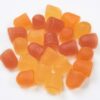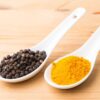
What You Need to Know About Turmeric for Joints
Joint pain is a common complaint in the USA, with over 8.5 million people suffering from pain attributed to osteoarthritis alone and even more people experiencing acute joint pain from other causes, such as injury. But what are the causes of joint pain, and what is true? What do they say about turmeric curcumin for joints? Whether you’re waking up with sore joints and muscles or you’ve had a sudden onset of soreness – we’ve got the advice and information you need to get you on the road to feeling a little more comfortable.
What is Joint Pain?
Joint pain, also known as arthralgia, is pain or soreness that can be felt in any of the body’s joints. Depending on the cause, joint pain can be accompanied by heat and swelling. Some of the most common areas affected by joint pain include:
- Knees
- Shoulders/neck
- Hips
- Lower back pain
- Hands
What Causes Joint Pain?
Joint pain can often be difficult to diagnose as there are many different causes, all of which require different treatments and result in various outcomes. Many cases of joint pain resolve themselves with time and do not cause further issues. However, other causes can trigger long-term problems. The most common reasons for joint pain include the following:
- Arthritis
- Rheumatoid arthritis
- An infection within the body (such as colds and flu)
- Fibromyalgia
- Gout
- Vitamin D deficiency
- Injury
- Intense exercise
- Menopause
Post Exercise Linked Pain
Anyone who frequents the gym will have suffered from DOMS in their time, but it can also be common to feel joint pain after exercise – especially if you’ve gone a little too hard during a session.
This is because exercise, especially weight-bearing exercise, puts stress on the body. However, joint pain and inflammation will ensue when too much stress is put on cartilage. This is especially common among those who increase their exercise intensity too quickly, but it’s essential to rest the area until it’s feeling better to prevent further injury.
However, if your joint pain becomes a regular occurrence after exercise or does not improve with rest, then it might be worth speaking to your doctor to rule out any other causes, such as arthritis.
What is Good for Joint Pain?
If you’ve suddenly found yourself suffering from painful joints, whether it’s your knee, elbow, or wrists, there are a few things that are good for joint pain that may help to alleviate some of the discomforts.
Give it The Cold Shoulder.

If your joint pain occurs shortly after exercise and is accompanied by heat and swelling, then ice can help reduce some of the inflammation and take away some of the pain.
Simply apply an ice pack for 20 minutes at a time every 2-4 hours for the first 24-48 hours after the onset of joint pain. However, heat therapy should be used for more than 48 hours of pain.
Rest and Relax
It goes without saying that you should rest the affected area if it’s swollen and painful, which means no more gym sessions that’ll work that particular joint until it has fully healed.
If you were looking for an excuse to put your feet up and get stuck into a new Netflix series, then acute joint pain is undoubtedly a good one! When resting, try to elevate the painful joint to help to reduce some of the swellings in that area too.
Movement
While rest is super-important for acute joint pain, keeping the area moving is imperative to prevent stiffness and further pain – especially if the joint pain is chronic.
Low-impact exercises such as swimming, walking, or cycling will help keep the affected joint moving without placing too much strain on it and strengthen the muscles around your joints. It’s important to stretch correctly before exercise to prevent injury and ensure you’ve got a good range of motion in your joints before you start.
Aim for around 20 minutes of light exercise daily, but don’t push yourself if the joint is feeling worse during exercise – it’s all about listening to your body.
Over-the-Counter Medicines
If you’re suffering from a flare-up or acute joint pain, then over-the-counter medication, such as nonsteroidal anti-inflammatory drugs, may help to reduce the pain, swelling, and inflammation which often accompanies joint pain. Besides, if you’re looking for a natural treatment, then go for turmeric for joints.
Get Your Turmeric Fix
You’ll often hear about people who take turmeric for their joints. That’s because turmeric has been said to have anti-inflammatory properties (as well as other health benefits!) thanks to its compound curcumin.
Some pain may be alleviated by reducing inflammation and swelling around the affected joint. If you’d like to see if taking turmeric works for you, the best way to take turmeric is as part of a drink, such as Turmeric Curcumin & Black Pepper Gummies. It can take 4-8 weeks to start noticing the proposed anti-inflammatory benefits, so consuming it consistently every day is essential.
Whether you’ve had a sudden onset of joint pain or you’ve been suffering from it for a while – our advice might help you to alleviate some of your swelling and pain to get you feeling more like yourself again. And if you’d like to reap the suggested benefits of turmeric for joints besides any turmeric supplement, then treat yourself to one of the homemade turmeric shots to give yourself the best chance of recovery.
References
https://www.ncbi.nlm.nih.gov/pmc/articles/PMC7812094/
https://www.mdpi.com/2072-6643/14/1/41
https://www.nccih.nih.gov/health/turmeric
https://www.ncbi.nlm.nih.gov/pmc/articles/PMC3918523/
https://www.ncbi.nlm.nih.gov/pmc/articles/PMC5664031/
Arthritis Foundation. Turmeric. Available at: www.arthritis.org/living-with-arthritis/treatments/natural/supplements-herbs/guide/turmeric.php. Accessed January 7, 2019.
Chin KY. The spice for joint inflammation: anti-inflammatory role of curcumin in treating osteoarthritis. Drug Des Devel Ther. 2016; 0:3029–3042.
Daily JW, Yang M, Park S. Efficacy of turmeric extracts and curcumin for alleviating the symptoms of joint arthritis: a systematic review and meta-analysis of randomized clinical trials. J Med Food. 2016;19(8):717–729
Hewlings SJ, Kalman DS. Curcumin: A review of its effects on human health. Foods. 2017; 6(10):92.
NIH National Center for Complementary and Integrative Health. Turmeric. Available at:
https://nccih.nih.gov/health/turmeric/ataglance.htm. Accessed January 7, 2019.
Taiba Tariq
Taiba Tariq is a healthcare nutrition hobbyist, enthusiastic about researching healthcare & skincare news while analyzing the latest and science-backed evidence about nutrition, skin care, and supplements. She wants to help people regain their beauty, health, and well-being through natural means.
all author posts




